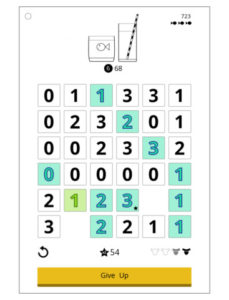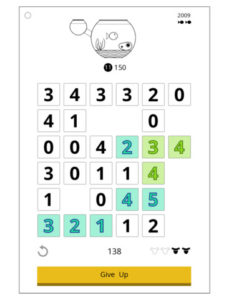It seems like only earlier this month that I reviewed an iOS game of mathematically-driven tile-management, which is probably because we recently looked at Tilemetry (our review). Now while Tilemetry certainly wasn’t necessarily bad — or anything like that — the game didn’t exactly quite deliver as much as we would have preferred either, but at least it was available for free. Either way — whether you liked it or not — having so recently handled Tilemetry meant I couldn’t really help but to think of that app as I plowed through Funcraft Games’ freshly debuted Maximize (out now, $2.99).
It would seem that poor Max the fish is about to run out of freshwater, and the only way to solve this is by moving numbered tiles around until a suitably high score can be achieved (I’ll freely admit it, not one ounce of that sentence made any sense whatsoever). Points are earned whenever a three-or-more chain of tiles — in either the four cardinal directions, or any of the diagonals in between — is either a series of sequential numbers, or a perfectly matching set of just one number. Players can do this by grabbing any tile and then dragging it in any of the four main directions (as long as there’s a tile there too), after which the two tiles will be added together (dropping the tens digit when necessary).
 The point value of these chains — whenever formed — will be the sum-total of all the numbers included, yet these rewarded points will be lost should the user ever decide to break the relevant chain for any reason. However, players will quickly discover — with their needed point-total increasing with each and every level — that they’re soon going to need to do more than simply chain a bunch of numbers together. After all: players wouldn’t want for Max the fish to die, and yet he will should you fail to reach the target score three whole times (forcing you to start back again at level one afterwards).
The point value of these chains — whenever formed — will be the sum-total of all the numbers included, yet these rewarded points will be lost should the user ever decide to break the relevant chain for any reason. However, players will quickly discover — with their needed point-total increasing with each and every level — that they’re soon going to need to do more than simply chain a bunch of numbers together. After all: players wouldn’t want for Max the fish to die, and yet he will should you fail to reach the target score three whole times (forcing you to start back again at level one afterwards).
The primary method to nabbing scores high enough to save Max — much like the biggest key to success in Scrabble — is to get your number chains to over lap each other, although successfully doing so often takes planning. Whenever a tile becomes simultaneously involved in more than one chain, the point value of all those involved chains will be multiplied by the number of chains that key-tile was a part of. Furthermore, the point multiplication afforded by these multi-chain bearing tiles will even stack — quickly leading to sky-high super scores — should more than one be found within the same chain.
Another way to quickly jack up the value of your points will be to include the special star-tile in even a single chain, which immediately multiplies your over all score by yet another 2x multiplier. People must be careful to never move the star-tile — or add anything to it — as doing so will permanently strip the tile’s special star properties, making it sometimes rather hard to successfully use the star-tile. Players will need to carefully decide each level whether or not this star-tile is even worth using, as often too many tiles must be destroyed just to place it within a chain (rendering it an often risky gambit).
 The final tool in a player’s fish-saving repertoire will be their joker cards, which can replace any one tile with a joker that can effectively serve as whatever number would be the most immediately advantageous. These cards — which are inherently limited in supply — are earned only by scoring massively more points during a stage than was required, discouraging players from advancing the exact moment the bare minimum is earned. Seeing as how a judiciously placed joker can salvage a run about to go horribly wrong, players are advised to go out of their way to earn these priceless life-savers whenever possible.
The final tool in a player’s fish-saving repertoire will be their joker cards, which can replace any one tile with a joker that can effectively serve as whatever number would be the most immediately advantageous. These cards — which are inherently limited in supply — are earned only by scoring massively more points during a stage than was required, discouraging players from advancing the exact moment the bare minimum is earned. Seeing as how a judiciously placed joker can salvage a run about to go horribly wrong, players are advised to go out of their way to earn these priceless life-savers whenever possible.
All of this chain-forming action is — rather thankfully — managed with tightly-performing controls, meaning you’ll never be driven to rage just because Maximize decided to move a tile other than the one you intended. However — despite the controls being otherwise solid — you’re additionally covered should you ever wish to revert your most recent venture, since there’s always an “undo move” button on the screen’s lower left corner. Do be careful — however — as although this button is always free to use without any form of penalty attached, you can never use this button to revert further back than a single unfortunate decision.
In closing — with Maximize featuring an extremely minimalist presentation — there isn’t exactly much more for me to say about this particular app, although it’s still worth mentioning there’s nary an IAP to be found. Anyways, the reason I previously mentioned Tilemetry is that — unlike that app I reviewed earlier this month — Maximize never once had any serious troubles with keeping me engaged and entertained. Although Maximize isn’t nearly as free as Tilemetry was, I can otherwise whole-heartedly recommend this tightly-crafted game of math meets Scrabble (after all, Max desperately needs your help).
Verdict
Maximize is a game that could best be described as the number-based version of Scrabble, with players dragging and adding tiles in an attempt to obtain as many points as possible (with bonus points being awarded whenever these number-chains also overlap). Funcraft Games’ latest offering — which features over-all tight controls — is immediately enjoyable, and players are likely to find themselves trying time and time again to save Max from being flushed down the drain. Those whom previously tried Tilemetry — and found themselves afterwards hoping for something a bit meatier — are definitely recommended to snatch up Maximize, as its well-worth the upfront asking price.


